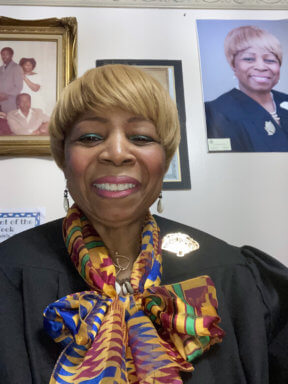Presiding during the pandemic quite challenging: Judge Sandra Roper

Civil Court Judge of The City of New York, Sandra Elena Roper says that presiding during the COVID-19 pandemic was “quite a challenge.”
Judge Roper — an Afro-Latina, of Caribbean ancestry, who was elected to the Civil Court in November 2017 by the people of Brooklyn as the insurgent Democratic and Reform Party candidate — said that, despite the challenges, during the pandemic, she “admirably rose to the occasion,” so much so that her working hours “became 24/7”, as she was “researching and writing decisions and orders in the wee hours of the night.”
“There is a misconception that the court was closed. Not at all!” said Judge Roper, who migrated to the US at age seven from Panama with her maternal grandparents, Lionel and Cecilia Scott. She is the eldest child of Ralph and Norma Roper.
Judge Roper said her Costa Rican father “walked over the border” with his Jamaican parents at age nine, so her grandfather could work on the Panama Canal. Ralph Roper’s maternal Jamaican grandfather was a railroad worker, Judge Roper said.
She said her maternal grandparents were Panamanian of Barbadian ancestry.
During the pandemic, Judge Roper said her “stately courtroom” — where she delivered justice, “with its beautiful panoramic view,” and where she held several weddings — “morphed” into her home courtroom.
She told Caribbean Life on Sunday that, once she donned her judicial robe, she “deliberated and delivered justice at home no differently” than if her courtroom was in-person, “albeit there were occasional technical glitches.”
Judge Roper said she had the “laborious mission,” as the Pandemic Motion Judge in Kings (Brooklyn) Civil Court — arguably the busiest court in the State of New York, “to churn out decisions and orders daily and nightly”, stating that she “certainly kept the court dockets moving.”
“A difficult challenge during the pandemic was finding counsel of record; and, even more difficult, was finding unrepresented litigants,” she said.
Prior to the pandemic, Judge Roper said emails were not required on the court’s paperwork.
So, in short order, Judge Roper, with her very diligent court attorney, said she “developed an email database that included the emails of counsel, marshals and unrepresented litigants, which, in and of itself, was yeoman’s work.”
Pre-pandemic, Judge Roper said she had “a cadre of court staff to help,” which, during the pandemic, “in essence, dwindled” to just Judge Roper and her court attorney.
Notwithstanding the myriad of pandemic challenges, Judge Roper said she ensured that all cases before her were “fully and thoroughly deliberated.”
Within a month of the world’s pandemic shut-down, she said she authored a timely pandemic seminal case of first impression.
There, she acknowledged that, “particularly in the gentrifying communities of our city, the small brick and mortar businesses as the lifeblood of our functioning society, which builds communities, must be protected and any undue interference may be regulated by the Legislature, notwithstanding the private right to contract in our capitalistic society,” Judge Roper said.
Now, amid the pandemic shutdown, she said the landlord resorted to “shenanigans” and violated the 2019 Harassment Law”.
Judge Roper said, while education is her family’s watchword, she was also raised to “love, respect, be kind and generous to all.”
As a child, she said she was “very much geared toward the sciences as an honor student.”
She said a pivotal point, which turned her interest toward the law, occurred when she was 12.
Judge Roper said her mother – a housewife, with her “quite distinct Panamanian Black Latina, Caribbean-rooted-accent” (the same accent that led to her neighbor’s son being the creator of Reggaeton, El General) – made a down payment for a new living room set for Christmas.
“While returning from Christmas shopping, Mama (mother) saw the same living room set for about $200.00 less,” Judge Roper recalled. “Needless to say, she went directly back to cancel her order only to be confronted by the manager, who told her that she could not cancel the contract although, clearly, in the fine print there was a clause providing a legally mandated consumer protection three3-day rescission period.”
Judge Roper said her mother was “a feisty, strong and smart woman that would not be bullied, and retorted that they will be hearing from her lawyer.
“The money was refunded,” she said, adding that, at Christmas, the family had the new furniture for $200 less.
Judge Roper said “the protective power of the law peaked” her interest that Christmas.
In her “prejudicial tenure” as an ardent Civil Rights attorney, Judge Roper said she is admitted to the New York state and federal courts, New Jersey state and federal courts, DC Court of Appeals, and US Supreme Court, where she authored an Amicus Brief challenging the constitutionality of New York State Voting Residency Law.
Among other noteworthy cases, she has authored legislative proposals and executive summaries for “house rich and cash poor predatory mortgage lending”; and represented clients faced with race and sex discrimination; police excessive force; “unfair oligopolistic pharmacy trade practices; and burdensome consumer debt practices against seniors and the disabled.”
Judge Roper, while presiding in Criminal Court, authored a seminal DNA case decision that ordered “a 17-year-old’s DNA collected by NYPD and stored by the City’s Office of the Chief Medical Examiner (OCME) must be destroyed, because he was not of legal age to consent to the swab.”
The ruling also noted there is no law prohibiting nor authorizing the storage of DNA.
In the strongly-worded decision, drawing on Supreme Court precedent, Judge Roper of Manhattan Criminal Court ruled that, “since adolescents’ brains are still developing, they cannot legally consent to the search, and a parent or guardian must sign off.”
The court also held that the OCME, New York City’s forensics laboratory, is “not permitted under state law to permanently store DNA taken from people who have never even been convicted of crimes.”
Judge Roper said she also had a short tenure as a pharmaceutical corporate counsel.
In addition, she said she has been a hospital pharmacist for 42 years, and still maintains interest in breast and ovarian cancer drug research.
Judge Roper attained her BS degree in pharmacy from Long Island University (LIU); juris doctorate (JD) from Brooklyn Law School; and Master of Laws (LL.M) from New York University (NYU) Law School, as a Food and Drug Law Fellow.
Judge Roper said she has received many awards and recognitions for her academic and philanthropic endeavors.
She said she lives her life by the Biblical motto instilled by her “Papa” (father): “Upon whom much is given, much is expected” (Luke 12:48).




